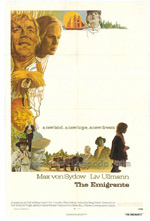
THE EMIGRANTS
Sweden, 1972, 150 minutes, Colour.
Max von Sydow, Liv Ullmam.
Directed by Jan Troell.
The Emigrants was acclaimed as one of the best films of 1972 and it is an impressive work of art. Written, photographed, edited and directed by Jan Troell, it is a fine piece of film-making that makes one wonder why other countries have not succeeded in making similar striking explorations of their origins or development.
Beautiful colour photography of landscape and profiles, small incidents shown for their significance as well as their emotional impact are the main ingredients for the success of the film. Its relentless thrust convinces us of the difficulties of rural life in Sweden and the inexorable decision of leaving home and finding another land. The voyage to America and its prolongation by train and riverboat is an exhausting and moving experience.
Max von Sydow gives a more relaxed performance than in most of his Bergman films. Liv Ullmann, at the crest of her popularity and achievement, is completely convincing as Kristina.
A moving and humane film about one of the strangest and hardest of human realities - migration.
1. How moving was this film? Why?
2. What techniques did the film use to build up its pictures of rural life in Sweden in the mid-nineteenth century? Were many words used? Why?
3. Was the film too episodic, or were the episodes satisfactorily blended into a harmonious whole?
4. Did you find the visual presentation of Sweden beautiful? How did that beauty belie the reality and force its people to emigrate?
6. Did the film give a convincing picture of rural life - the homes, work, small properties, difficulties, weather, crops, marriage, families, religion, superstition?
6. What kind of people were the family? Karl Oskar? Kristina?
7. How did the film communicate the characters of the family by means of short selected incidents and facial close-ups? How much emotional response was asked for in these incidents? How successful were they?
8. What impact did the story of Robert and Arvid make? What did it add to the theme of the film? To our feelings about the family and their difficulties?
9. What did the story of Uncle Daniel, his religious non-conformism, his having Ulrika in his household add to our awareness of life in Sweden, to the theme of emigrating, to our feelings about the family? How much of a charlatan was Uncle Daniel?
10. How relentless on the family (and on audience feeling) were the succession of difficulties (weather, crops, death, pregnancies) that finally forced the decision to emigrate? Why was Kristina so fearful?
11. Did the film communicate to the audience the mentality of the migrants, both the sorrow of leaving home and the mixture of fear of the unknown and vision for the future that emigration meant?